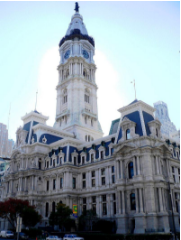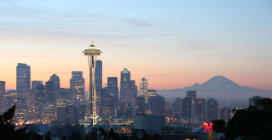Advocates for public health-based soda taxes had two important victories this month: a Pennsylvania appeals court dismissed an industry lawsuit challenging Philadelphia’s soda tax and the Seattle City Council became the ninth US jurisdiction to tax sodas.
 On June 14, 2017, the Pennsylvania Commonwealth Court ruled in favor of the tax in a 5-2 decision., This is the second judicial affirmation of the legality of the tax in Philadelphia, which has the second highest prevalence of obesity (29.3%) and diabetes (10.7%) among large US cities.
On June 14, 2017, the Pennsylvania Commonwealth Court ruled in favor of the tax in a 5-2 decision., This is the second judicial affirmation of the legality of the tax in Philadelphia, which has the second highest prevalence of obesity (29.3%) and diabetes (10.7%) among large US cities.
Appellants, led by the American Beverage Association, argued that the 1.5 cent-per-ounce tax violates the prohibition on duplicative taxation and is pre-empted by the federal Food Stamp Act and the Tax Code, which prohibit taxes on items purchased under the Supplemental Nutrition Assistance Program (SNAP). The majority opinion written by Judge Wojcik, rejected the appeal, holding that the tax does not violate either Pennsylvania state laws or federal law because it applies to non-retail distribution transactions and not retail sales to the consumer.
Philadelphia mayor Jim Kenney released a statement on the same day, saying “Two courts have now considered the arguments of the beverage industry and both are certain that the Philadelphia Beverage Tax stands on solid legal grounds.” He urged the beverage industry to cease its legal and public relations battle that has already cost millions. “Our entire city desperately needs us to be able to move forward with the programs funded by the tax and we will be unable to do that in full until full legal action is resolved.”
The city has committed to spend revenue from the soda tax on for improving Pre-K and community education, rebuilding city facility like libraries, parks and community centers. Revenue is predicted fall short of the $46.7M projected for January-June 2017. At this stage, the reason for the shortfall is unclear. But if the reason is decreasing soda purchases, then the tax is achieving its public health objectives to discourage consumption.
 Moving from the East coast to the West, Seattle City Council passed its $ 1.75 cent-per-ounce soda tax on June 5, 2017. The 7-1 vote makes the emerald city the ninth US jurisdiction to embrace a public health-based soda tax, joining Albany, Berkeley, Oakland, and San Francisco in California; Boulder, Colorado; Cook County, Illinois; Philadelphia, Pennsylvania, and the Navajo Nation. The legislation covers sweetened beverages such as soda, juice, sports drinks, flavored water, energy drinks, and pre-sweetened coffee or tea, with exceptions for mike products, 100% juice, formula or sweetened medication. Diet soda was slated for taxation in Mayor Ed Murray’s proposal, but it was eventually removed by the City Council on the basis that diet sodas are less harmful to health than regular sweetened beverage products. The tax will take effect on January 1, 2018, and is expected to collect $15 million annually. The revenue will be spent on education programs and food access strategies like fresh bucks, which will help ensure access to nutritious food and beverage products.
Moving from the East coast to the West, Seattle City Council passed its $ 1.75 cent-per-ounce soda tax on June 5, 2017. The 7-1 vote makes the emerald city the ninth US jurisdiction to embrace a public health-based soda tax, joining Albany, Berkeley, Oakland, and San Francisco in California; Boulder, Colorado; Cook County, Illinois; Philadelphia, Pennsylvania, and the Navajo Nation. The legislation covers sweetened beverages such as soda, juice, sports drinks, flavored water, energy drinks, and pre-sweetened coffee or tea, with exceptions for mike products, 100% juice, formula or sweetened medication. Diet soda was slated for taxation in Mayor Ed Murray’s proposal, but it was eventually removed by the City Council on the basis that diet sodas are less harmful to health than regular sweetened beverage products. The tax will take effect on January 1, 2018, and is expected to collect $15 million annually. The revenue will be spent on education programs and food access strategies like fresh bucks, which will help ensure access to nutritious food and beverage products.
Seattle’s new soda tax confirms the growing momentum behind soda taxes as a popular and effective means of helping to reduce sugar consumption and obesity. The appellate court’s ruling on Philadelphia’s soda tax confirms that cities can take on – and overcome – industry efforts to undermine valuable public health interventions.



